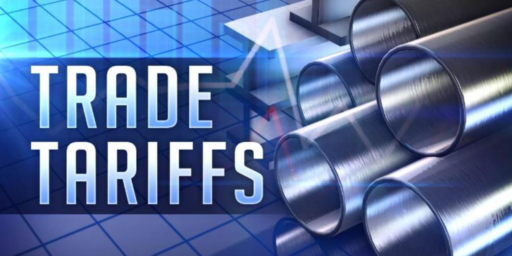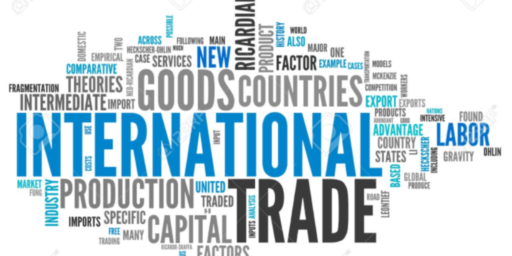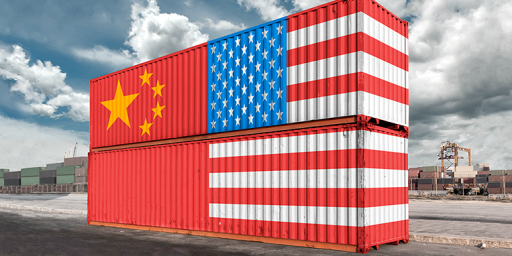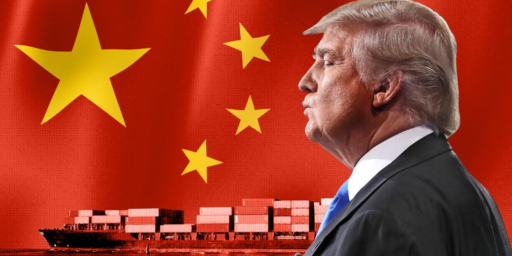China and Trade War Tactics
The great negotiator in the White House is likely underestimating the tools available to Xi.
Via the NYT: Why China Is Confident It Can Beat Trump in a Trade War
In the political realm, however, Mr. Xi enjoys advantages that may allow him to cope with the economic fallout far better than Mr. Trump can. His authoritarian grip on the news media and the party means there is little room for criticism of his policies, even as Mr. Trump must contend with complaints from American companies and consumers before important midterm elections in November.
The Chinese government also has much greater control over the economy, allowing it to shield the public from job cuts or factory closings by ordering banks to support industries suffering from American tariffs. It can spread the pain of a trade war while tolerating years of losses from state-run companies that dominate major sectors of the economy.
“My impression is that there is in Washington an exaggerated sense of how painful these tariffs might be” in China, said Arthur R. Kroeber, managing director of Gavekal Dragonomics, a research firm in Beijing.
At worst, he estimated, the American actions could shave one-tenth of a percentage point off China’s economic growth — hardly enough to force a drastic reversal of policies, given the enormous benefits that Chinese leaders see in the state-heavy economic model they have relied on in recent decades.
At the same time, Chinese officials seem to believe they can take advantage of what they consider vulnerabilities in the American political system.
“The American agricultural sector is quite influential in the Congress,” said Wang Yong, a professor of economics at Peking University, explaining why China has targeted farm products such as soybeans with possible retaliatory tariffs. “China wants the American domestic political system to do the work.”
If one looks at the threatened tariffs, and the maps of who would be affected, there is credence to this theory.






The tariffs aren’t to hurt China and anyone assuming they are is making a significant misjudgement of the situation. This is a conflict between global capital and nationalist capital with the goal of determining how to apportion U.S. incomes among their class.
..
I have a theory of the case that is a bit different. Trump likes to get into confrontatious dominance displays, show he can push people around. However, in Chinese culture, saving face, not losing face is important. What better way to save face than to cause the adversary to lose face – which is what embarrassing Trump by mistreating Trump’s most loyal voters would do.
One example would be targeting fruits and nuts, which just happen to come largely from very Republican areas of California.
I can’t wait to see the theory somewhere in the right-wing fever swamp that the Chinese are working with the Democrats to help them win elections in the Midwest so that they can take back control of Congress…
Trump already gave away one of the best tools to influence China, the Transpacific Partnership (TPP). It was aimed right at China. Now, a lot of those countries are now working their own deals with China without us.
I bet Trump didn’t even know that China was not part of TPP.
OBTW, apparently Ivanka Trump’s Chinese made clothes business is not affected by any proposed tariffs.
@Scott: The abandonment of the TPP was stupid (and it was stupid for HRC as well–I had some hopes that if she won she would finesse a way to back off her rejection).
I accept that there are a host a negative aspects of global trade for aspects of US domestic economies–but I know that the global nature of the economy is not going away and we need to manage it as best we can.
@Steven L. Taylor:
Sure it is. All you have to do to make it happen is believe strongly enough, get mad, vote for a moron in a fit of pique, and maybe click your heels together three times while shouting “there’s no place like 1955!”
Or so I heard in the Rust Belt anyway … 🙂
@HarvardLaw92: IPE is so complicated!
@Steven L. Taylor: How much of the TPP did you read?
@Steven L. Taylor: the global nature of the economy is not going away and we need to manage it as best we can.
And is that what we’ve been doing? Or have we been following policies that serve the economic interests and ideological obsessions of some at the expense of others?
It seems pretty clear that at least to some degree the political rise of Donald Trump is directly tied to the FAILURES of the policies championed by folks like James Joyner and HarvardLaw92. Those policies were sold on fairly specific promises which have gone unfulfilled.
People have been complaining about these failures for years and the James Joyners and HarvardLaw92s of the world have either ignored the complaints or responded with a not-terribly-veiled Dickensian attitude that anyone not served by these policies should just die and decrease the surplus population. Neither of those responses has a great historical track record.
And if the end result of this trade conflict is to affirm that it is China as she is currently conceived that will run the world and not the United States or the West, the James Joyners and HarvardLaw92s are not going to enjoy it any more than the rest of us.
Mike
@MBunge: You’re attempting to communicate with people who think the TPP’s allowance of forced labor is just the price that has to be paid because “global economy.”
@MBunge:
Newsflash, “Mike” – post-industrialism is nothing new. We’re not the first industrialized economy in the world to go through it, and we won’t be the last.
Our policy position has been clear for decades – life as you knew it back in the halcyon days of the 1950s and 60s is over. Dead. Not coming back. Your choices are to retrain, equip yourselves for the new reality that isn’t going anywhere no matter how loudly you stomp your feet, or sit there waiting to die.
We were quite willing to fund all manner of programs for the former, but we found that not only were these people not interested in retraining, they also resented us for suggesting that it was necessary in the first place. Somehow, America was supposed to be a special place that would preserve their no longer economically viable expectations. They didn’t want reality. They wanted snake oil and magical promises. Along comes the GOP offering them that, and they bought it – hook, line and sinker.
And no, there will be no revolution by these people. To suggest otherwise is the height of self-serving rhetoric. They’ll do exactly what they are already doing – sitting and watching as the last gas station closes and their kids OD. Know how I know this? Because it has happened before.
Note that there are industrialized economies still holding their own – Sweden, Germany, etc., but those economies all seem to sport one common factor – levels of taxation and government subsidy that would stop most Americans dead in their tracks. $5 if you can figure out which political party in the US is interested in raising taxes based on their recirculatory effects in order to benefit the nimrods out in flyover country. Our folks in Middle America don’t want that either, even if it would help them. They want what they want (1955), how they want it (without having to move an inch, much less to another state), and when & where they want it (now, and right there in lovely downtown Shitburg where they live). We have a word for that sort of attitude …
Childish. If they want to act like children, they shouldn’t be surprised that they’re treated like children – given candies (meaningless political promises) to shut them up and get them to cooperate so that the parents can focus on the things they’re actually interested in (which – shocker – tend not to be the children 24/7).
I can’t speak for James, but a fairly significant portion of our revenue derives from Chinese firms engaged in the international markets. Likewise Korea, Japan, Australia, and Europe, That nice, big office complex we occupy in Beijing is located there for a reason. In fact, we’re approaching a point where our international revenue will outweigh our domestic. The market for our services went global, therefore so did we. We’ve long passed the point where the majority of our offices were located in the US. Smart people adapt, and they prosper as a result of doing so. Stupid people sit on the tracks waiting to get run over by the train.
And, funnily enough, it always hits them, whether they believe it will happen or not …
When you’re through shouting at the clouds about the elite, maybe you’ll see the light in time to get out of the way. Who can say …
@Ben Wolf:
No. Calm down, Che. He’s dealing with people who, to paraphrase The West Wing, recognize that Chinese political prisoners are going to be sewing soccer balls with their teeth whether we sell them cheeseburgers or not, so why not sell them cheeseburgers?
By all means, though, keep shouting at the clouds about injustice and getting nowhere. Best of luck … 🙄
Ever hear of Federal Prison Industries? Now called Unicor? http://www.unicor.gov
@HarvardLaw92:
I was watching some show last night and it came to a familiar trope: Character A says to Character B, “You need to pack up and move, a disaster is coming!” To which Character B replies, “But I could never leave Hogwaller, it’s my home!”
To which Character A ought to say, “OK then, sayonara. Say hello to the tidal wave when it gets here.” But writers take that tropey dialog as some kind of profound epiphany. As if stayin’ put raht heah, is brilliant homespun wisdom. No, it’s not stubborn bravery it’s just stubborn stupidity. People sitting in empty little towns in the middle of nowhere, doing nothing because the job they used to do got up and left 20 years ago. Then they wonder why their kids move away and their neighbor is shooting up between his toes.
Things change, what was easy becomes impossible, what was hard becomes commonplace, the center will not hold and all that, but your job as a homo sapiens is to use the big cauliflower up there in your skull and survive. If you just sit on your stoop just waiting for the rolling disaster to get to you, you’ve failed Intro to Evolution.
Sam Kinison puts it cruelly but effectively. “We just drove 700 miles with your food, and it occurred to us, that there wouldn’t be world hunger if you people would live where the food is!”
@michael reynolds:
Yup. I said on another thread that the Chinese play the long game, in a manner that befits a civilization which is more which is more than 5,000 years old. They’re always thinking 10 moves ahead, something that appears to be impossible for a nation which is less than 300 years old to begin to contemplate.
Witness how they responded to Trump’s idiotic quotas. They didn’t come back with a huge basket of randomly selected products (which is, as far as I can tell, how the Trump admin selected its quota targets). No, they zeroed in on the relatively few things which will cause maximum pain within the confines of the GOP base.
We’re – as we speak – at a point where farmers in the Midwest are making decisions about which crops to plant and how many acres to devote to each. Along comes China, torpedoing in on soybeans in laser-like fashion (which should have been utterly predictable to anyone with a brain). Farmers, understandably, are going to cut back on acreage for soybeans (and every other agricultural on China’s well formed list, like sorghum. Texas, Nebraska and Kansas right there …).
Less to sell = less profit = pissed off farmers. Commodities prices are already at 10 year lows, and China drops a bomb on the table which will cut right through the middle of the Midwest. If they’re resolute about it (and when has China ever not been), they’ll be putting the more marginal producers out of business altogether. Moreover, it won’t do so immediately. It’ll kick those Midwestern farmers – the heart of the GOP base – squarely in the teeth in mid to late summer, just in time for the real run up to a midterm election.
Meanwhile, China has been dramatically ramping up its purchasing of Brazilian soybeans (Brazil is conveniently already in harvest). They’re clearly gearing up for extended economic warfare, and to be frank, they’ll win, for a list of reasons which start and end with centralized government control of the media, massive state ownership of critical industries, and overt control of the Chinese banking system – coupled with a mountain of dollars big enough to float the Titanic. China took action in mid-2017 to put its thumb on capital outflows, and as a result is sitting on nearly $3.5 trillion in hard dollars in its foreign reserves. Compare that with the US’s tiny $125 billion in foreign reserves, and our abject dependency on borrowing to fund government finances.
It’s honestly like children are sitting in DC thinking that all they have to do is bluster, and China will back down. It won’t. Trump has put them into a situation where doing so would result in a loss of face, and nothing is more offensive to the Chinese psyche. At this point, Trump had better hope China doesn’t decide to sit out a Treasury auction or two, just to more vividly make its point. The US is about to get its ass kicked.
@HarvardLaw92:
That could incentivize some congresscritters to tone down or perhaps even withdraw their loyalty to Trump.
1-) The United States is not the only country in the world, many large companies don’t have business in the United States. Huawei is not allowed to sell most of it’s goods in the US, and it’s one of the largest telecommunications companies in the world. Volkswagen is one of the largest carmakers in the world while selling very little cars in the US.
Imposing tariffs won’t help you conquer global markets.
2-) The experience in Latin America is that tariffs for established industries creates markets that are inefficient. Take a look at Brazil or Argentina.
3-) Global trade allows things to get cheaper for the consumer. Consumer goods are cheaper in the United States than basically everywhere else, and that’s a great asset for things like tourism and the service sector of the economy in general.
@Charon:
Yup. Trumpkins think that he plays 10 dimensional chess. The Chinese actually do. They’ve created a situation where they can negatively impact the US agricultural sector whether they actually impose tariffs or not. US farmers are now legitimately terrified to go into debt to fund crops which they may not have a market for / which they’ll on net lose money on 6 months from now. The net result will be additional reduced acreage under plant, and if this goes on much longer, that decision to limit planting will be beyond the point where farmers can take any catch-up measures to get crops into the ground in time for harvest season. For a great many of those farmers, who have already purchased seeds and/or rented acreage, they’re already past the point of no hope and no return.
One need only overlay the production maps for soybeans and sorghum to see that the Chinese deliberately set out to target GOP strongholds in the Midwest for selective, maximum damage while relatively sparing California and the West Coast states. Moreover, this stupid trade war policy risks China establishing new supplier relationships with other countries who will be eager to step in and replace the US with regard to agricultural exports. Australia, in particular, is already making moves to position itself in that regard. Some of those lost exports will undoubtedly never be recovered.
As to your point, you’re absolutely correct, except that it’s already happening.
Try to fathom the stupidity of someone who kicks off a trade war which disproportionately impacts his strongest base of support. It honestly beggars belief. Justin Wolfers eloquently stated the basic nature of the problem here, and why China will win, when he said
Anybody want to field a guess about the correct answer to that question? 🙂
@HarvardLaw92: They have so many other tools its not even funny, There Sovereign wealth Funds own 1.6 Trillion in US stock, They have cut off Rare Earths to Japan in the past over a fricken fishing boat captain, The Chinese now have interest in over 2/3 of the Top 50 Container Ports in the world… etc etc etc
Trump still thinks he is dealing with China of the 1990s
@Ben Wolf:
I will admit: none. And, I will admit that perhaps there is something in the agreement that would cause me to change my mind. My point, which I know you do not accept, is that given the nature of the economy that the US loses by not being involved.
@Ben Wolf:
Well, one, Bunge isn’t dealing me as I stopped trying to decipher his comments and engage them a while back.
And yes: I understand your position–again, it is less an issue of accepting any particular factor, such as labor conditions in China and elsewhere, as a price worth paying. It is more capitulation to reality. As much as I hate to paraphrase Don Rumsfeld, but you have to deal with the global economy you have, not the one you wish you had. Moreover, the issue at the moment isn’t between rectifying the injustices of the global economy or maintaining the status quo. Rather, the choice at the moment is the status quo v. trade wars that will not improve anyone’s working conditions.
@DAVID:
Agreed. He has fundamentally misjudged his opponent here, and it was never a battle of equals to begin with.
Couple in the Fed’s expectation that it will stop buying MBS’es in mid 2018 (throwing an enormous amount of volatility that had been safely confined to the Fed’s balance sheet back into the private sector – which will respond by raising mortgage rates in order to secure the market and backstop investor risk so those investors will keep buying the bonds.)
One of two things happens here: either the Fed finds itself forced to continue buying those bonds in order to avert an enormous slowdown / mini-collapse in the US housing market, which limits its ability to participate in backstopping with regard to the domestic consequences of a trade war, or it finds itself forced to stop the buying in order to free up capital so that it can participate.
We’re left with a situation in which our central bank has the choice of negatively impacting the housing market or being unable to prevent negatively impacting the consumer goods markets. Either way, the US economy – and more to the point US consumers – will get kicked in the teeth.
Meanwhile, China’s central bank has a $3.5 trillion hard currency warchest and the government has the ability to absorb a good deal of the negative effects, thereby insulating the Chinese consumer in a way that the US just can’t afford to do.
Trump picked the absolute worst opponent to engage in a trade war and the absolute worst time frame in which to do so (there is never a good time for a trade war, but we’re particularly vulnerable right now).
Just in time for an election. It would appear that there is a Santa Claus if you’re a Democrat.
This potentially overrides any existing national, state or local laws.
That’s it. While extensive language broadens and empowers private capital to acquire and control media and information, the best this agreement does for the public sphere is acknowledge it should exist. Somewhere.
This is written so vaguely it potentially violates the 1st Amendment.
No evidence. No warrant. No judgement.
The consistency plans written into the agreement virtually exempted Vietnam, Brunei and Malaysia from enforcing laws on slavery, religious persecution, and wholesale violation of women’s and LGBTQ rights. Mexico and Peru, with a very long history of labor rights violations, go completely unmentioned.
And I can go on like this all day. Chapter 18 is a playground for corporate malfeasance. Copyright laws, laws protecting free movement of capital and laws to protect corporate investments and return have no purpose but to destroy the “invisible hand” of which Adam Smith wrote. And yet we’re expected to accept it not because it’s a social good, but because of the Yellow Peril.
@Ben Wolf:
This is not what I said, and I don’t appreciate the characterization. I said that not being involved takes away US influence.
How not being involved increases influence and leverage, of solves any of the problems you wish solved, is beyond me.
@Steven L. Taylor: No one said you did. It wasn’t directed at you, but Barack Obama, who effectively campaigned for the TPP as a racist, and the generic liberal who dutifully mouthed the same bigotry in service to Team Democrat.
@DAVID:
Not surprising, since he seems to have stopped procession all information–outside of his own self-interest–at about that point. The crime rate is going up! (It’s been declining for years.) Hordes of Mexicans are streaming over our border! (They’re finding more and more work in Mexico.) I’m a winner! (He’s a broken-down old roué.)
I worked for 2 years to save up $5k to move to WA state from the deep south, for a better life. I was told I could put my job on hold here and transfer out there, no big. I moved out there, applied for the transfer, waited, waited, interviewed, waited, interviewed again, after 5 months ran out of money, borrowed $500 from a friend to pay another month’s rent, waited, and then was told at month 6 that my position had been eliminated, too bad, so sad, best of luck. My roommate’s boyfriend was threatening me at that point for being a month behind on the rent. I had to borrow $900 from my parents to drive back across country and resume my previous life, now 2 years older and broker than before.
Just picking up and moving to better opportunities is not as easy as some people believe.
@teve tory: I’ve picked up and moved a few times. Two times worked out well early on. Two times were brutal. Fortunately past that now, but I’m sorry to hear your WA adventure didn’t turn out well. Didn’t you mention last summer that you were making a go of it in the Shelton area?